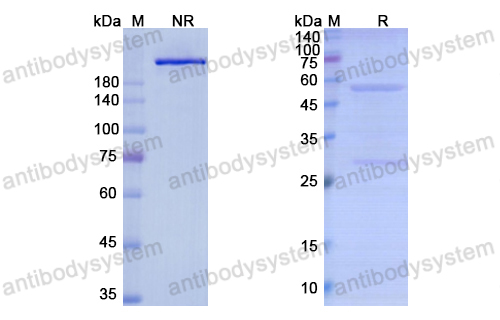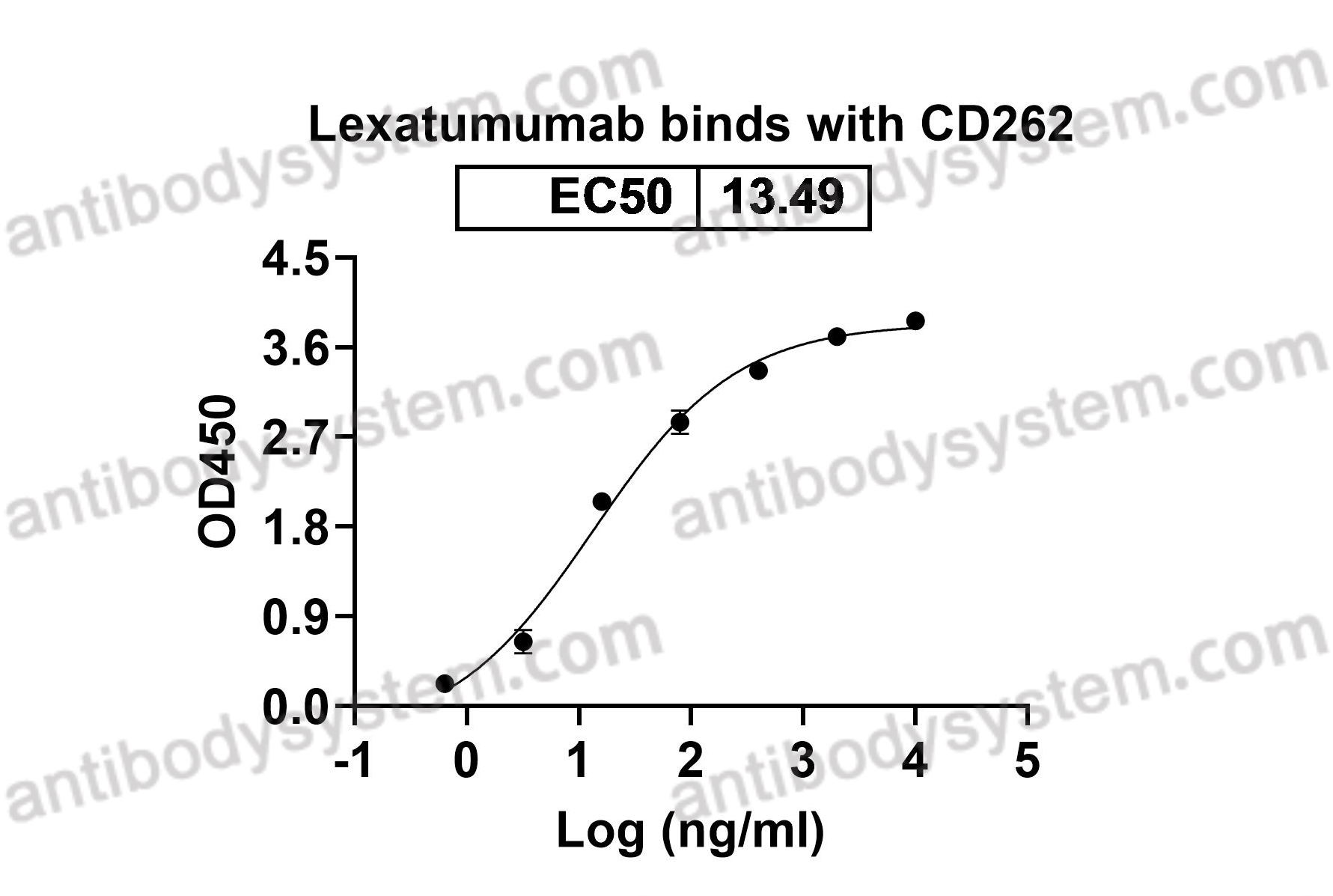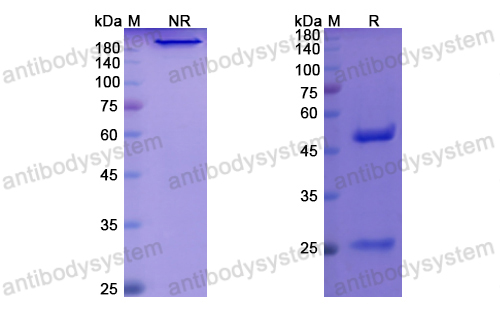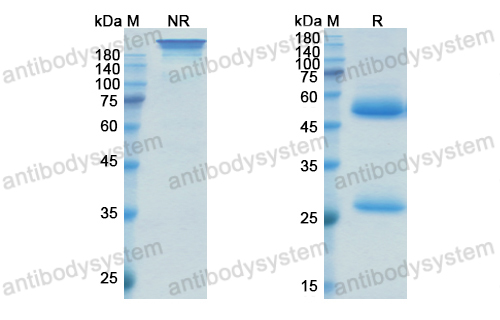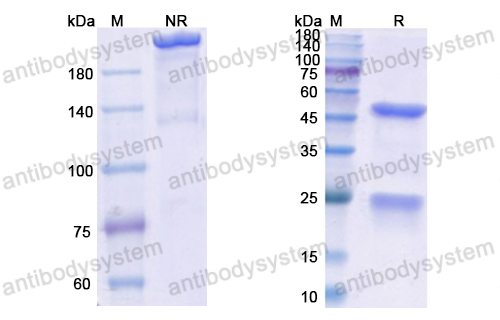99m Tc-Labeled lexatumumab, PMID: 20641185
111 In-Labeled lexatumumab, PMID: 20641892
Lexatumumab (TRAIL-receptor 2 mAb) induces expression of DR5 and promotes apoptosis in primary and metastatic renal cell carcinoma in a mouse orthotopic model, PMID: 17184908
Phase 1 and pharmacokinetic study of lexatumumab in patients with advanced cancers, PMID: 17947486
Enhancement of lexatumumab-induced apoptosis in human solid cancer cells by Cisplatin in caspase-dependent manner, PMID: 19276256
Histone deacetylase inhibitors enhance lexatumumab-induced apoptosis via a p21Cip1-dependent decrease in survivin levels, PMID: 17638911
Mapatumumab and lexatumumab induce apoptosis in TRAIL-R1 and TRAIL-R2 antibody-resistant NSCLC cell lines when treated in combination with bortezomib, PMID: 19174554
Focal adhesion kinase inhibitor PF573228 and death receptor 5 agonist lexatumumab synergistically induce apoptosis in pancreatic carcinoma, PMID: 28459212
Phase I and pharmacokinetic study of lexatumumab (HGS-ETR2) given every 2 weeks in patients with advanced solid tumors, PMID: 19633048
Dacarbazine and the agonistic TRAIL receptor-2 antibody lexatumumab induce synergistic anticancer effects in melanoma, PMID: 23029050
Delineation of apoptotic genes for synergistic apoptosis of lexatumumab and anthracyclines in human renal cell carcinoma cells by polymerase chain reaction array, PMID: 22205156
Drug evaluation: lexatumumab, an intravenous human agonistic mAb targeting TRAIL receptor 2, PMID: 17243490
Phase I trial and pharmacokinetic study of lexatumumab in pediatric patients with solid tumors, PMID: 23071222
RIP1 protein-dependent assembly of a cytosolic cell death complex is required for inhibitor of apoptosis (IAP) inhibitor-mediated sensitization to lexatumumab-induced apoptosis, PMID: 22927431
Combined treatment with lexatumumab and irradiation leads to strongly increased long term tumour control under normoxic and hypoxic conditions, PMID: 19860913
Human agonistic TRAIL receptor antibodies Mapatumumab and Lexatumumab induce apoptosis in malignant mesothelioma and act synergistically with cisplatin, PMID: 17953743
Reactive oxygen species is essential for cycloheximide to sensitize lexatumumab-induced apoptosis in hepatocellular carcinoma cells, PMID: 21347335
111 In-Labeled mapatumumab, PMID: 20641403
99m Tc-Labeled mapatumumab, PMID: 20641397
Enhanced metastasis suppression by targeting TRAIL receptor 2 in a murine model of triple-negative breast cancer, PMID: 21653692
Methionine Deprivation Induces a Targetable Vulnerability in Triple-Negative Breast Cancer Cells by Enhancing TRAIL Receptor-2 Expression, PMID: 25724522
Low concentrations of doxorubicin sensitizes human solid cancer cells to tumor necrosis factor-related apoptosis-inducing ligand (TRAIL)-receptor (R) 2-mediated apoptosis by inducing TRAIL-R2 expression, PMID: 17922852
Death receptors as targets in cancer, PMID: 23638798
Cell death via DR5, but not DR4, is regulated by p53 in myeloma cells, PMID: 22738917
Gateways to clinical trials, PMID: 17003851
Therapeutic targeting of the TNF superfamily: a promising treatment for advanced endometrial adenocarcinoma, PMID: 22885470
TRAIL-based therapeutic approaches for the treatment of pediatric malignancies, PMID: 23458616
Low-dose anisomycin sensitizes melanoma cells to TRAIL induced apoptosis, PMID: 23192275
TRAIL signaling is mediated by DR4 in pancreatic tumor cells despite the expression of functional DR5, PMID: 20354842
Altered regulation of extrinsic apoptosis pathway in HCV-infected HCC cells enhances susceptibility to mapatumumab-induced apoptosis, PMID: 19788693
TRAIL-induced apoptosis is preferentially mediated via TRAIL receptor 1 in pancreatic carcinoma cells and profoundly enhanced by XIAP inhibitors, PMID: 20940278
Impact of p53 status on TRAIL-mediated apoptotic and non-apoptotic signaling in cancer cells, PMID: 30947287
Primary ovarian cancer cells are sensitive to the proaptotic effects of proteasome inhibitors, PMID: 20126991
Gateways to clinical trials, PMID: 20664824
Blocks to thyroid cancer cell apoptosis can be overcome by inhibition of the MAPK and PI3K/AKT pathways, PMID: 24603332
Augmented antitumor activity against B-cell lymphoma by a combination of monoclonal antibodies targeting TRAIL-R1 and CD20, PMID: 17671142
RIP1 is required for IAP inhibitor-mediated sensitization for TRAIL-induced apoptosis via a RIP1/FADD/caspase-8 cell death complex, PMID: 22890322
Synthetic retinoid CD437 induces apoptosis and acts synergistically with TRAIL receptor-2 agonist in malignant melanoma, PMID: 22446330
Phosphorothioate-modified TLR9 ligands protect cancer cells against TRAIL-induced apoptosis, PMID: 19734228
Aspirin sensitizes cancer cells to TRAIL-induced apoptosis by reducing survivin levels, PMID: 18483385
Spectral imaging-based methods for quantifying autophagy and apoptosis, PMID: 21757995
Sorafenib sensitizes solid tumors to Apo2L/TRAIL and Apo2L/TRAIL receptor agonist antibodies by the Jak2-Stat3-Mcl1 axis, PMID: 24086526
Off-target lapatinib activity sensitizes colon cancer cells through TRAIL death receptor up-regulation, PMID: 21653830
A double hit to kill tumor and endothelial cells by TRAIL and antiangiogenic 3TSR, PMID: 19366809
Efficacy of triple therapies including ionising radiation, agonistic TRAIL antibodies and cisplatin, PMID: 19424623
Small molecule inhibitor YM155-mediated activation of death receptor 5 is crucial for chemotherapy-induced apoptosis in pancreatic carcinoma, PMID: 25344582
A small molecule Smac mimic potentiates TRAIL-mediated cell death of ovarian cancer cells, PMID: 17292950
Mitomycin C potentiates TRAIL-induced apoptosis through p53-independent upregulation of death receptors: evidence for the role of c-Jun N-terminal kinase activation, PMID: 22895172
Aldehyde dehydrogenase (ALDH) activity does not select for cells with enhanced aggressive properties in malignant melanoma, PMID: 20505780
Bortezomib sensitizes non-Hodgkin's lymphoma cells to apoptosis induced by antibodies to tumor necrosis factor related apoptosis-inducing ligand (TRAIL) receptors TRAIL-R1 and TRAIL-R2, PMID: 17875785
Carboxypeptidase A4 negatively regulates HGS-ETR1/2-induced pyroptosis by forming a positive feedback loop with the AKT signalling pathway., PMID:38049405
Celastrol enhances TRAIL‑R2‑mediated apoptosis and cytotoxicity in human renal cell carcinoma cells in caspase‑dependent manner., PMID:37997857
TRAIL-mediated signaling in bladder cancer: realization of clinical efficacy of TRAIL-based therapeutics in medical oncology., PMID:37432489
miR-3132 upregulates surface TRAIL to induce apoptotic cell death in cancer cells., PMID:35141020
A patch of positively charged residues regulates the efficacy of clinical DR5 antibodies in solid tumors., PMID:34731630
Impact of p53 status on TRAIL-mediated apoptotic and non-apoptotic signaling in cancer cells., PMID:30947287
Focal adhesion kinase inhibitor PF573228 and death receptor 5 agonist lexatumumab synergistically induce apoptosis in pancreatic carcinoma., PMID:28459212
Methionine Deprivation Induces a Targetable Vulnerability in Triple-Negative Breast Cancer Cells by Enhancing TRAIL Receptor-2 Expression., PMID:25724522
Small molecule inhibitor YM155-mediated activation of death receptor 5 is crucial for chemotherapy-induced apoptosis in pancreatic carcinoma., PMID:25344582
Blocks to thyroid cancer cell apoptosis can be overcome by inhibition of the MAPK and PI3K/AKT pathways., PMID:24603332
Sorafenib sensitizes solid tumors to Apo2L/TRAIL and Apo2L/TRAIL receptor agonist antibodies by the Jak2-Stat3-Mcl1 axis., PMID:24086526
Death receptors as targets in cancer., PMID:23638798
TRAIL-based therapeutic approaches for the treatment of pediatric malignancies., PMID:23458616
Low-dose anisomycin sensitizes melanoma cells to TRAIL induced apoptosis., PMID:23192275
Phase I trial and pharmacokinetic study of lexatumumab in pediatric patients with solid tumors., PMID:23071222
Dacarbazine and the agonistic TRAIL receptor-2 antibody lexatumumab induce synergistic anticancer effects in melanoma., PMID:23029050
RIP1 protein-dependent assembly of a cytosolic cell death complex is required for inhibitor of apoptosis (IAP) inhibitor-mediated sensitization to lexatumumab-induced apoptosis., PMID:22927431
Mitomycin C potentiates TRAIL-induced apoptosis through p53-independent upregulation of death receptors: evidence for the role of c-Jun N-terminal kinase activation., PMID:22895172
RIP1 is required for IAP inhibitor-mediated sensitization for TRAIL-induced apoptosis via a RIP1/FADD/caspase-8 cell death complex., PMID:22890322
Therapeutic targeting of the TNF superfamily: a promising treatment for advanced endometrial adenocarcinoma., PMID:22885470
Cell death via DR5, but not DR4, is regulated by p53 in myeloma cells., PMID:22738917
Synthetic retinoid CD437 induces apoptosis and acts synergistically with TRAIL receptor-2 agonist in malignant melanoma., PMID:22446330
Delineation of apoptotic genes for synergistic apoptosis of lexatumumab and anthracyclines in human renal cell carcinoma cells by polymerase chain reaction array., PMID:22205156
Killing of resistant cancer cells with low Bak by a combination of an antimesothelin immunotoxin and a TRAIL Receptor 2 agonist antibody., PMID:21813632
Prediction of proapoptotic anticancer therapeutic response in vivo based on cell death visualization and TRAIL death ligand-receptor interaction., PMID:21785270
Spectral imaging-based methods for quantifying autophagy and apoptosis., PMID:21757995
Death receptor 4 is preferentially recruited to lipid rafts in chronic lymphocytic leukemia cells contributing to tumor necrosis related apoptosis inducing ligand-induced synergistic apoptotic responses., PMID:21699383
Off-target lapatinib activity sensitizes colon cancer cells through TRAIL death receptor up-regulation., PMID:21653830
Enhanced metastasis suppression by targeting TRAIL receptor 2 in a murine model of triple-negative breast cancer., PMID:21653692
Reactive oxygen species is essential for cycloheximide to sensitize lexatumumab-induced apoptosis in hepatocellular carcinoma cells., PMID:21347335
High TRAIL-R3 expression on leukemic blasts is associated with poor outcome and induces apoptosis-resistance which can be overcome by targeting TRAIL-R2., PMID:21281967
TRAIL-induced apoptosis is preferentially mediated via TRAIL receptor 1 in pancreatic carcinoma cells and profoundly enhanced by XIAP inhibitors., PMID:20940278
Gateways to clinical trials., PMID:20664824
Aldehyde dehydrogenase (ALDH) activity does not select for cells with enhanced aggressive properties in malignant melanoma., PMID:20505780
TRAIL signaling is mediated by DR4 in pancreatic tumor cells despite the expression of functional DR5., PMID:20354842
Primary ovarian cancer cells are sensitive to the proaptotic effects of proteasome inhibitors., PMID:20126991
Combined treatment with lexatumumab and irradiation leads to strongly increased long term tumour control under normoxic and hypoxic conditions., PMID:19860913
Altered regulation of extrinsic apoptosis pathway in HCV-infected HCC cells enhances susceptibility to mapatumumab-induced apoptosis., PMID:19788693
Phosphorothioate-modified TLR9 ligands protect cancer cells against TRAIL-induced apoptosis., PMID:19734228
Phase I and pharmacokinetic study of lexatumumab (HGS-ETR2) given every 2 weeks in patients with advanced solid tumors., PMID:19633048
Efficacy of triple therapies including ionising radiation, agonistic TRAIL antibodies and cisplatin., PMID:19424623
A double hit to kill tumor and endothelial cells by TRAIL and antiangiogenic 3TSR., PMID:19366809
Enhancement of lexatumumab-induced apoptosis in human solid cancer cells by Cisplatin in caspase-dependent manner., PMID:19276256
Efficacy of a triple treatment with irradiation, agonistic TRAIL receptor antibodies and EGFR blockade., PMID:19224142
Mapatumumab and lexatumumab induce apoptosis in TRAIL-R1 and TRAIL-R2 antibody-resistant NSCLC cell lines when treated in combination with bortezomib., PMID:19174554
Aspirin sensitizes cancer cells to TRAIL-induced apoptosis by reducing survivin levels., PMID:18483385

